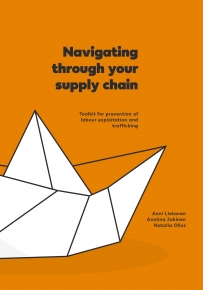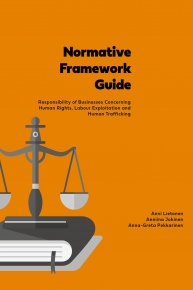In recent years, cases of labour exploitation in supply/subcontracting chains have been uncovered around the world, as well as in Europe. Outsourcing of work or services through subcontractors/suppliers or use of temporary workers in flexible employment relationships heighten the risk of exploitative working conditions. The working conditions in lengthy subcontracting chains might be difficult for companies to uncover. Everything may seem legal on paper but in reality, exploited migrant workers might work long hours in poor conditions, which are below national standards, and they have little or no possibility to change their situation. To protect the rights of migrant workers, to promote fair competition and decent work, as well as to avoid negative publicity businesses have a responsibility to address the risk of labour exploitation and human trafficking in their subcontracting or supply chains.
 The “Navigating through your supply chain – Toolkit for prevention of labour exploitation and trafficking” developed in the EU-funded FLOW-project by the European Institute for Crime Prevention and Control (HEUNI) and partners will assist companies in this by demonstrating the associated risks and how involvement in such scenarios can be effectively avoided. The five hands-on tools focus on the implementation of due diligence processes and provide concrete measures to navigate and control complex supply chain networks especially in local, national and intra-European contexts. These measures include conducting a risk assessment, drafting an anti-trafficking strategy, screening contractual partners, incorporating specific contractual clauses and organising workplace assessments to prevent and address the risks of labour exploitation and trafficking.
The “Navigating through your supply chain – Toolkit for prevention of labour exploitation and trafficking” developed in the EU-funded FLOW-project by the European Institute for Crime Prevention and Control (HEUNI) and partners will assist companies in this by demonstrating the associated risks and how involvement in such scenarios can be effectively avoided. The five hands-on tools focus on the implementation of due diligence processes and provide concrete measures to navigate and control complex supply chain networks especially in local, national and intra-European contexts. These measures include conducting a risk assessment, drafting an anti-trafficking strategy, screening contractual partners, incorporating specific contractual clauses and organising workplace assessments to prevent and address the risks of labour exploitation and trafficking.
To supplement the toolkit, a Normative framework guide is published. This complementary guide summarizes the existing legal frameworks outlining companies’ human rights responsibilities with a focus on labour exploitation and trafficking. Both the toolkit and the guide are specifically meant for businesses and organizations that use low-skilled migrant workers through e.g. subcontracting or labour intermediaries, and businesses operating in risk sectors where exploitation and trafficking have been identified. It is also aimed at public procurement units, as well as Corporate Social Responsibility experts and networks.
The issue of safeguarding workers’ rights is even more pressing due to the current global COVID-19 pandemic which has effects reaching far and wide. Many its consequences will disproportionately affect the most vulnerable members of our societies. Several international organisations have recently raised alarm that traffickers use new and aggravated forms of violence and exploitation in order to turn a profit.
 HEUNI’s researcher Anni Lietonen echoes these concerns: “More people find themselves in economic hardship and as a result, exploitation becomes easier. Businesses should intervene as early as possible in situations of exploitation in order to effectively prevent more severe exploitation that might even amount to human trafficking.”
HEUNI’s researcher Anni Lietonen echoes these concerns: “More people find themselves in economic hardship and as a result, exploitation becomes easier. Businesses should intervene as early as possible in situations of exploitation in order to effectively prevent more severe exploitation that might even amount to human trafficking.”
The Toolkit and the Normative framework guide are released as electronic publications in English on May 6th, 2020 and are available here: https://bit.ly/FLOW_Toolkit_news Different language versions (in the FLOW project members’ languages Bulgarian, Estonian, Finnish and Latvian) as well as physical copies will be published later in 2020.
For more information, please contact: Researcher Anni Lietonen, HEUNI, tel. +358 50 411 67 (e-mail anni.lietonen@om.fi) or for country details contact atanas.rusev@csd.bg (Bulgaria), anna.markina@ut.ee (Estonia), and lasma.stabina@iem.gov.lv (Latvia).
Press release published by HEUNI on 6 May 2020



